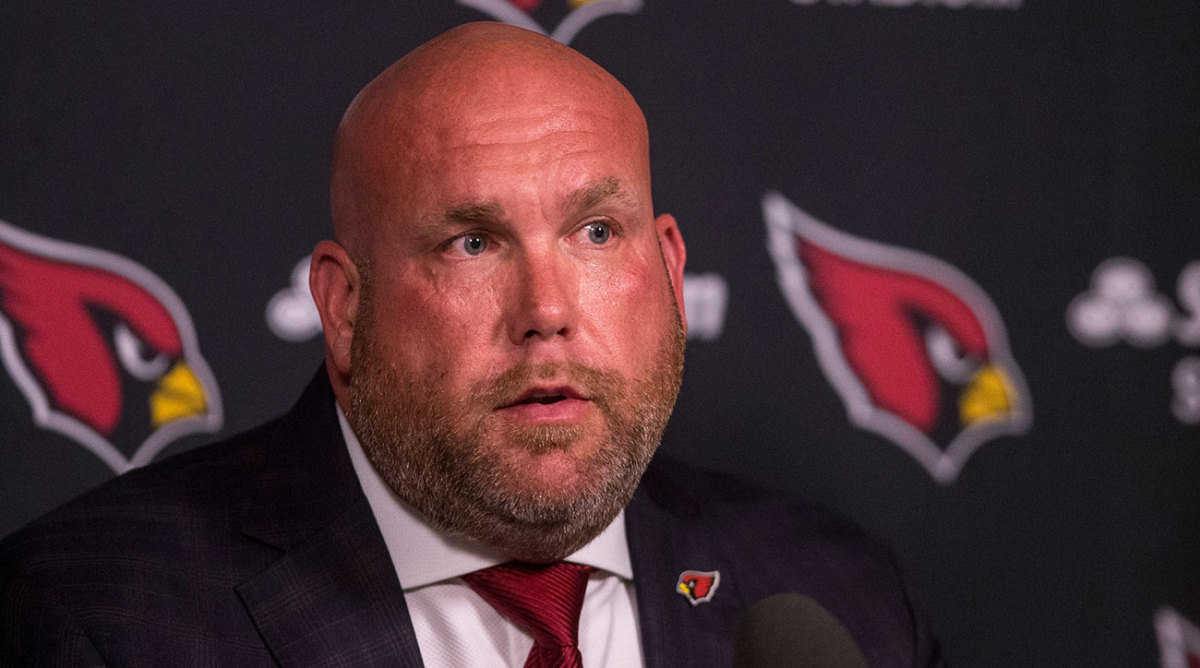Kyler Murray’s Homework Clause Was an Unforced Error the Cardinals Still Must Fix
The Cardinals tried to correct one of the great unforced errors in contractual language history Thursday, releasing a statement confirming that they’d deleted the controversial “homework” clause from quarterback Kyler Murray’s new deal. They did so after Murray himself called an unscheduled press conference to complain about it.
Part of the statement read: “After seeing the distraction it created, we removed the addendum from the contract. It was clearly perceived in ways that were never intended.”
Pray now for GM Steve Keim, who, like anyone who’s ever tried to hit the recall button on an embarrassing work email talking trash about a coworker, has no other tools in his belt to patch up the damage but time and patience (and whatever he learns from that aggressive finger-wagging by the HR department). Here’s hoping he enjoys awkward conversations and a little well-disguised public groveling. Here’s hoping the Cardinals win a lot of football games so this isn’t the controversy that defines his tenure as GM (Why hasn’t this guy been put in front of a microphone yet, by the way?)

We don’t need to rehash the utter stupidity of placing a clause in Murray’s very-easy-to-find contract necessitating Murray to sit alone in a room for four hours a week with an iPad, unallowed to scroll through his phone, play video games or watch television. But it’s fair game to point out the utter stupidity in thinking that simply removing the clause from the contract will fix the massive problem Arizona caused by writing it in the first place.
Through no fault of his own, Murray is now the “no homework” guy. We’ve all been to high school. We’ve all doled out or received a crappy nickname based on some horrifically embarrassing moment or unfortunate perceived faux pas in dress, speech or general appearance. It’s not fair. It’s not even close to acceptable. But we all understand how this works, right? As Seth says in the all-time classic Superbad: “People don’t forget.” Just because the Cardinals aren’t going to hold contract clauses over his head anymore doesn’t mean we’ll stop assuming, through no fault of our own, that any and all mistakes Murray makes on the field were a result of a lack of film study.
How easy is it going to be after a Murray interception for amateur tape grinders on Twitter to pull up a similar defensive look to the one that caused him to misfire? How easy is it going to be for all of us to meme a kid playing video games after each poor performance and caption it Kyler during independent study this week? The Cardinals set up a still-developing 24-year-old who came of age in the social media era to get roasted on a weekly basis on his platform of choice, all because an Offensive Rookie of the Year award and two straight Pro Bowls weren’t properly masking all the damage they’d caused elsewhere through years of subpar drafting and free-agency whiffs. Murray should see to it that his GM spends some time alone learning how to evaluate wide receivers so he doesn’t have to spend through the teeth replacing the ones he handpicked who couldn’t see the field.
Murray is no different now from a player with a high-profile weight clause in his contract. He has to embark on the same uphill journey as Eddie Lacy, after it was revealed that Lacy would make an average American’s yearly salary if he showed up to Seahawks camp in the team’s ideal weight range or we’d all (incorrectly) assume he was no longer playing because he couldn’t stick to a diet. (A similar report about the New Orleans Pelicans’ Zion Williamson having a weight clause came to light hours before the Cardinals’ statement Thursday.) Murray is no different than Sam Darnold, who, after admitting on an ESPN camera during Monday Night Football that he was “seeing ghosts” has since carried the perception that he is somehow incapable of handling pocket pressure. He is brothers in arms with Mark Sanchez, who could not walk anywhere near a fellow player’s posterior for the remainder of his career in fear that he would once again butt fumble. He is Geno Smith, the guy who got his face Picasso’d by an angry teammate.
Being a psychological alpha is such an intimate and essential part of playing the quarterback position effectively. The good coaches care about that part deeply and foster it. They put their developing players into the right locker rooms. They call the right plays for them. They guide the ascent with a steady hand.
The Cardinals, on the other hand, yanked their quarterback’s pants down and forced him to walk through the high school cafeteria.
Perhaps the most enjoyable part of this weeklong mini-saga was seeing people claim that the Arizona front office had achieved some kind of next-level galaxy-brain status for having this information made public. That they’d properly shamed their quarterback into working harder.
Thanks to them, there is more work to be done than ever before. Four hours a week ain’t going to cut it.
More NFL coverage:
